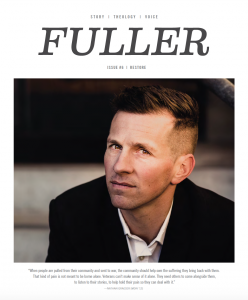“There is wisdom in seeing Christian formation centered in the Body of Christ—this is a communal endeavor, and there is something formative about gathering with others. Cultural liturgies that we are formed by regularly shape me to believe that I am the center of the world. To live out the tangible gritty realities of being a communal body knocks off the edges of that story and invites us to find ourselves in that communal flourishing.”
+ James K. A. Smith discusses cultural liturgies and spiritual formation with Vice President of Vocation and Formation Tod Bolsinger during the 2015 Payton Lectures. Access the video interview here. Above, retreatants from Fuller’s first Formation Group for ministers walk prayerfully through a labyrinth, an ancient practice that evokes the slow accumulating effect of daily spiritual formation.
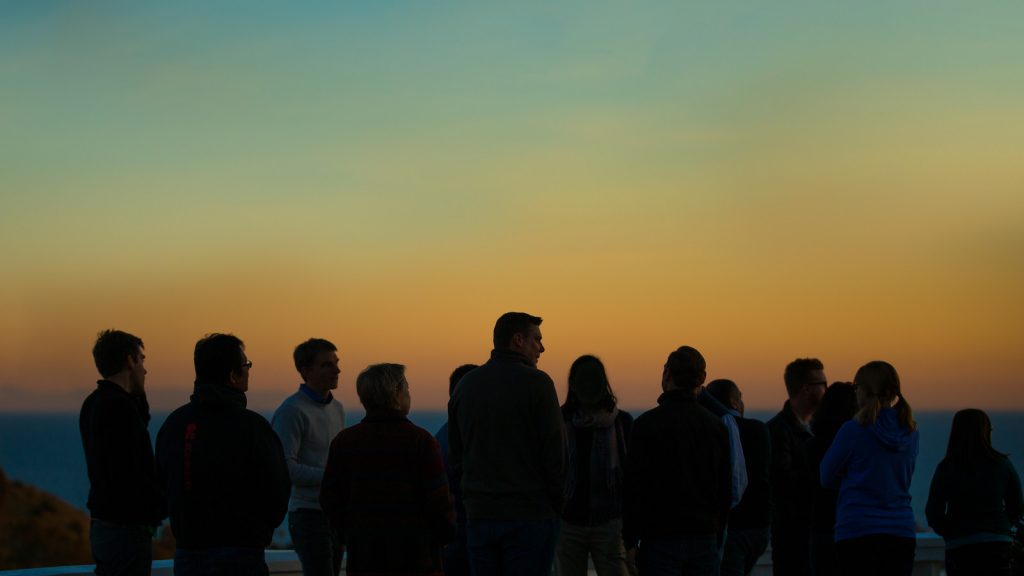
“We hit moments in life where we can’t survive by ourselves. Someone needs to feed us or care for us or bring us clothing or mow our lawn because we need help. There’s also a fundamental reason why we need this context of community: no one in the history of the world has been invited to follow God by themselves. . . . We need community to help us stay in the story. When we’re in these places of great trial, we can’t tell the truth to ourselves; it needs to be spoken to us.”
+ Executive Director of Fuller Formation Groups Brian Wallace recently guided a national group of church leaders through Fuller’s first Formation Group, an initiative to bring the curriculum of the Vocation and Formation Division to nontraditional settings. The formation group, pictured above, enjoyed the sunset at the Malibu retreat center.
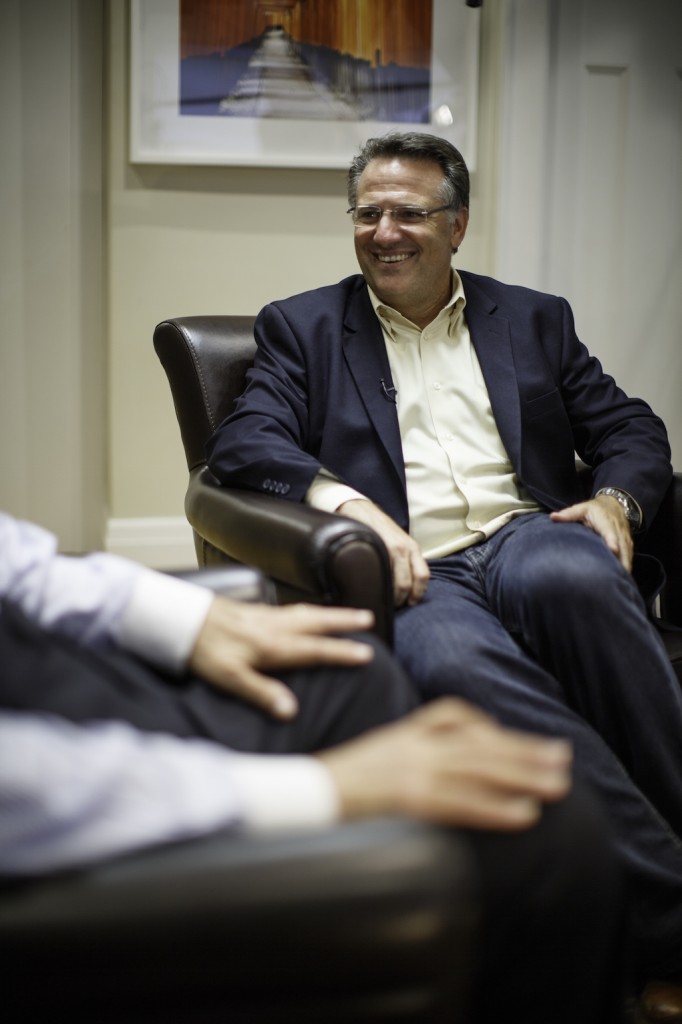 “Christian community is not merely about connection, care, and belonging. Spiritual transformation is not just about becoming more like Christ as an end in itself. In a post-Christendom world that has become a mission field right outside the sanctuary door, Christian community is about gathering and forming a people, and spiritual transformation is about both individual and corporate growth, so that they—together—participate in Christ’s mission to establish the kingdom of God ‘on earth as it is in heaven.”
“Christian community is not merely about connection, care, and belonging. Spiritual transformation is not just about becoming more like Christ as an end in itself. In a post-Christendom world that has become a mission field right outside the sanctuary door, Christian community is about gathering and forming a people, and spiritual transformation is about both individual and corporate growth, so that they—together—participate in Christ’s mission to establish the kingdom of God ‘on earth as it is in heaven.”
+ Tod Bolsinger (pictured at right) leads Fuller’s Vocation and Formation Division, an initiative at Fuller that combines leadership development and spiritual practices in a curriculum supported by small groups. Learn more about this division in videos available here and more about Bolsinger’s vision in issue #1 of FULLER magazine on vocation.
“Goals carve paths for people by giving them something to accomplish in the world. Stories provide a framework for putting events into a coherent structure that ties together the past, the present, and the future. And practices allow people to take actions that encapsulate the ends to which they aspire. By putting all these together, a pastor can change the way that her congregation sees the world, and by changing the ways that a congregant sees the world, the pastor can change the very world in which that person lives.”
+ Scott Cormode, director of innovation and professor of leadership development, on Christian leadership and the formation of congregations in his book Making Spiritual Sense: Christian Leaders As Spiritual Interpreters.
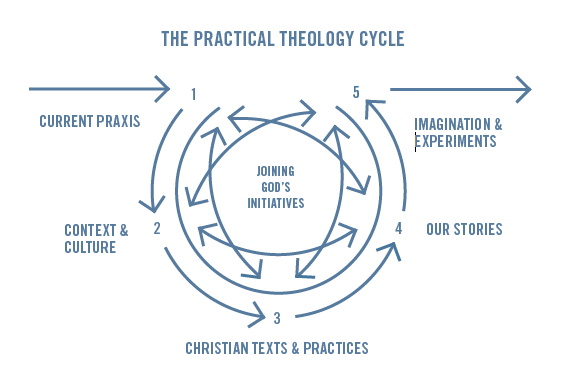
+ The “practical theology cycle” is a framework to understand Christian formation developed by Mark Lau Branson, the Homer L. Goddard Professor of the Ministry of the Laity. This cycle of spiritual growth (left) is both continuous and relational as communities look to culture, tradition, and shared narratives to participate in God’s transformation of the world. Learn more about this ongoing cycle of praxis and theological reflection here.
+ These current students reflect on different aspects of formation in their experience in the classroom and in small vocation and formation groups. Read more from them and others on the Touchstone Blog:
 “We can get so busy that we become overwhelmed by life’s circumstances, but it’s beneficial to pause and actually reflect. Reflection has become vital for me in seminary. With the immense amount of knowledge being poured into me daily, in order to process it all, it’s necessary to dwell in silence and listen to God.” –Quinn Harkless
“We can get so busy that we become overwhelmed by life’s circumstances, but it’s beneficial to pause and actually reflect. Reflection has become vital for me in seminary. With the immense amount of knowledge being poured into me daily, in order to process it all, it’s necessary to dwell in silence and listen to God.” –Quinn Harkless
 “Thinking on Jesus’ presence shapes things in the light of God: with creativity, with hope, with a deep yearning for reconciliation. And this is what ‘formation’ is meant to provide, especially when we have others to walk alongside. Thank God we do in this class.” –Matthew Schmitt
“Thinking on Jesus’ presence shapes things in the light of God: with creativity, with hope, with a deep yearning for reconciliation. And this is what ‘formation’ is meant to provide, especially when we have others to walk alongside. Thank God we do in this class.” –Matthew Schmitt
 “Being formed in community reminds me of God’s constant presence through the attentiveness, compassion, and vulnerability of other students. The vocation and formation group provided sacred space to listen for the voice of God and each other.” –Rebecca Stringer
“Being formed in community reminds me of God’s constant presence through the attentiveness, compassion, and vulnerability of other students. The vocation and formation group provided sacred space to listen for the voice of God and each other.” –Rebecca Stringer
 “To discover vocation, we must discover ourselves. To discover ourselves, we must listen to the voice of God as he speaks to us. To listen to God, we must be open to what he has to say.” –Kimberly Gray
“To discover vocation, we must discover ourselves. To discover ourselves, we must listen to the voice of God as he speaks to us. To listen to God, we must be open to what he has to say.” –Kimberly Gray
 “To hear God in all things and people requires an intentional readjustment of mind and heart. The whole self must be involved in the retuning process if we are to hear God in all the frequencies he is speaking. When we reorient old devotional habits, we can learn to make our time with God (and other things and people) much richer.” –Chris Lopez
“To hear God in all things and people requires an intentional readjustment of mind and heart. The whole self must be involved in the retuning process if we are to hear God in all the frequencies he is speaking. When we reorient old devotional habits, we can learn to make our time with God (and other things and people) much richer.” –Chris Lopez
Be honest and authentic to the best of our abilities
Be open and come with a learning attitude
Listen to others without judgment or fear
Refrain from offering unsolicited advice to others
Work for the relational health of the group as a whole
+ Before meeting in a vocation and formation group, every student signs a group covenant similar to the one quoted in part here. Lisa Nopacha, a group leader, says this covenant helps foster a safe space that can “hold stories in honor and care.” Learn more about the vocation and formation groups here.
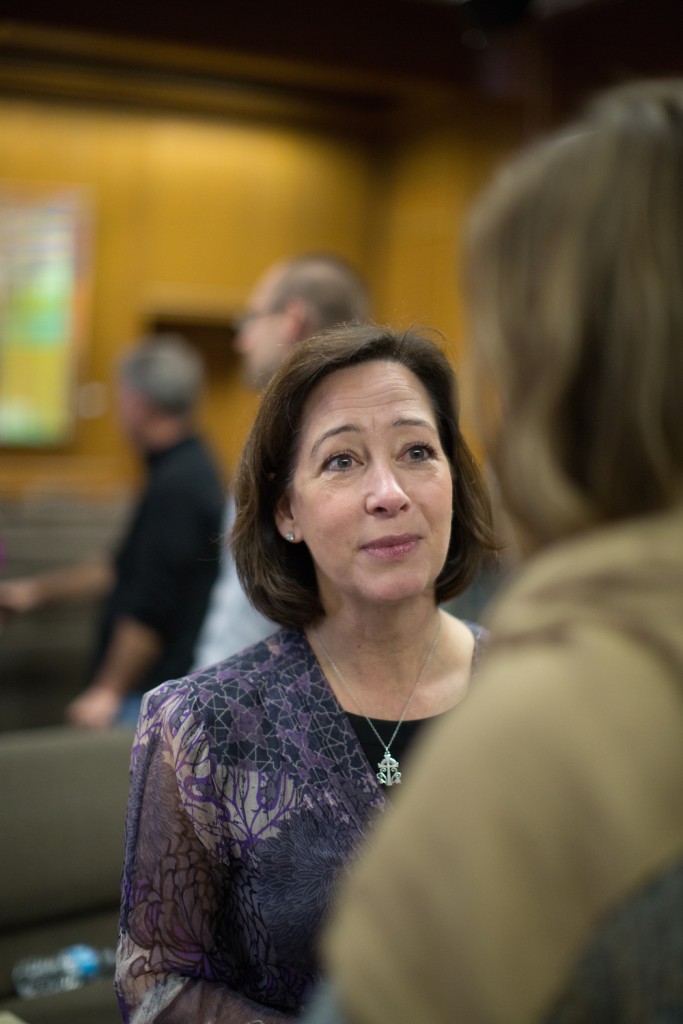 A conversation with Laura Harbert, affiliate professor of clinical psychology, on spiritual formation, resistance, and beholding God with unveiled faces:
A conversation with Laura Harbert, affiliate professor of clinical psychology, on spiritual formation, resistance, and beholding God with unveiled faces:
How would you define spiritual formation?
I don’t think that spiritual formation is one thing. It’s not one program that everyone steps into, and it’s not a cognitive model or a uniform system of discipleship. For some people their spiritual formation might be letting go and laying down all efforts and learning how to rest in their sense of being beloved. In that case, learning about breath prayer or just being able to cease striving is exactly what some people need for spiritual formation. For another person, it may be taking on disciplines like fasting or engaging more deeply in their community.
What is your vision for spiritual formation at Fuller?
I want to provide at Fuller a wide array of practices where people who are at different places in their spiritual life can dip in at the place where they have a need. I also want to develop multicultural spiritual formation opportunities and online spiritual formation, because I want to be able to respond to the diversity of our community and changing our world. Fundamentally, our formation is based in worship. Eugene Peterson says that “worship is the primary and core spiritual discipline,” and if there’s one thing we need to do together to nurture our spiritual lives it’s the practice of worship—
bringing ourselves into the presence of God with other people and letting that experience recalibrate us.
What is a significant problem Christians face today in their spiritual lives?
A part of the spiritual life is struggling with competing desires and resistance. Even though we might have a conscious desire for spiritual growth, we have unconscious blocks that keep us stuck. Think of Romans 7:19 where it says, ”I do not do the good I want to do, but the evil I do not want to do—this I keep on doing.” So I want to help people look at their resistance to spiritual formation and become more aware of what they deeply desire in their lives. Because when we listen for those deeper desires behind the barriers—whether it’s for connection, beauty, rest—that’s God speaking and stirring up life in us.
How does God work in our spiritual formation?
When I first started working here, I really felt God gave me this gift of a verse in 2 Corinthians 3:17-18, “Where the Spirit of the Lord is, there is freedom.” It’s not about guilt or obligation, and it’s not about becoming a super-Christian—spiritual formation starts with freedom, and it is God’s desire for us. And the verse continues that we “with unveiled faces beholding the glory of God” are being transformed. That’s the way we’re meant to be, and our role is to slowly unveil our faces and behold God’s glory. It can happen in worship, in relationships, in creation, in art—if we’re beholding glory, that is God’s presence, it changes us.
+ Laura Harbert oversees the spiritual health of the seminary as dean of chapel and spiritual formation. Listen to her discuss unexpected spiritual practices, attention, and the practice of silence here. Learn more about All-Seminary Chapel here.
Practices of Formation
“What greater purpose can exist than producing fruit that dispels the hatred, sadness or depression, violence, impatience, bullying, evil, broken promises, harshness, and addiction in our world? The cultivation of the Spirit’s fruit is desperately needed everywhere. However uniquely our individual purposes may be shaped by personality and talent, they must somehow help to replace the fruit of selfishness with the fruit of love in ourselves and others if we are to live meaningful lives.”
+ Paul Jensen [PhD ’07] is an adjunct professor at Fuller and the founder and president of The Leadership Institute, where he helps Christian leaders ground their ministry in spiritual practices.
“A spiritual practice that always reminds me of my grandmother is singing. She would often be in the kitchen cooking and singing—whether it was a spiritual or a hymn. Years later, I often sing myself, or listen to selected songs that are powerful for me. I’m very much aware of how important that is to center me on the promises and peace of God. . . . gospel songs, hymns, and spirituals keep me centered. It’s an increasingly important practice for me.”
+ Alexis Abernethy, discussing worship, formation, and her Templeton-funded research on worship and psychological transformation. She is in charge of faculty formation at Fuller as director of faculty spiritual formation for the Vocation and Formation division. Watch more here.
“We come from many different denominational backgrounds and worship experiences, and for that reason, it’s valuable to bring all of our ideas to the table and implement them in worship on a practical level. We hold tightly to our traditions whether we’re willing to admit it or not, so there is a humility that we have to bring to the table. We have to be willing to flex in some ways and be able to embrace things that may not be completely comfortable for us.”
+ Jenn Graffius, former director of chapel and staff spiritual formation, reflecting on the weekly preparation for corporate worship in All-Seminary Chapel at the Pasadena campus. Watch her interview and Fuller’s weekly chapel services available here.
“Who you are is how you minister. You can be an engineer and be a really rotten human being, and the buildings that you build will stand, but that won’t work as a minister of the gospel. Spiritual formation is not an added extra—it’s not a luxury for us. It’s at the very foundation of our ministry. Spiritual disciplines shape, form, help us to become ever more conformed to the image of Christ, which is really what spiritual formation is all about.”
+ Richard Peace is the Robert Boyd Munger Professor of Evangelism and Spiritual Formation at Fuller. Watch more of his reflections on spiritual practices here.
Further Reading
The Vital Connection: A Fresh Approach to Christian Spirituality and an Opportunity to Move On with God
John Goldingay (St. John’s Extension Studies, 1998)
The Spiritual Formation Series
Richard Peace (NavPress, 1998)
Meditative Prayer: Entering God’s Presence
Richard Peace (Wipf and Stock, 2015)
Soul Repair: Rebuilding Your Spiritual Life
Dale Ryan, Juanita Ryan, and Jeff VanVonderen (InterVarsity Press, 2008)
Available Classes
The Practice of Worship and Prayer with Catherine Barsotti (and other faculty)
Practices of Christian Community with Erin Dufault-Hunter (and other faculty)
The Practice of Mission with Peter Lim (and other faculty)
The Touchstone Course with Tod Bolsinger (and other faculty)
Psychology and Spiritual Formation: Integrating Research and Practice with Sarah Schnitker
Spiritual Traditions and Practices with Richard Peace (and other faculty)
The Spiritual Disciplines with Richard Peace

